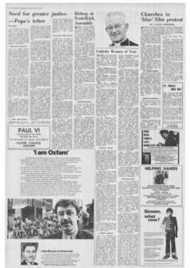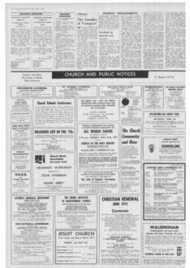Page 6, 21st May 1971
Page 6

Report an error
Noticed an error on this page?If you've noticed an error in this article please click here to report it.
Tags
Share
Related articles
Films By Freda Bruce Lockhart
At The Cinema
Russia's Elusive Genius Of The Wider Cinema
At The Cinema
Films By Freda Bruce Lockhart
Disturbing mirror on our preoccupations
FILMS by Freda Bruce Lockhart
SELDOM does the cinema hold such a comprehensive and disturbing mirror to the obsessions and preoccupations of today as the week of films I have just seen. War and revolution, past and future, or even present, propagandist. fictional or pilloried, are all spread out on the big screen. Most startling is the mysteriously titled Ice ("X," The Other Cinema, King's Cross). Learn. ing that the film ran for two hours and 12 minutes I approached it with fearful memories of dreary wastes of ice pantomime.
Finding the screen, however, busy with the shadowy plots and plans of cells of underground urban guerrillas, I decided the title must stand for the initials of "International Communist . . ."? "E" for what? Experiment? Exercise? Enterprises? So I rang The Other Cinema to ask and was assured the title meant what it said—"ice."
As a title it is still mystifying —unless an evocation of black ice might convey the climate of the operations being planned. For this is not so much a story as a glimpse into a not-toodistant future — three to 20 years is the period postulated.
Apparently the United States is at war with Mexico, and an underground network of impassioned young revolutionaries prepare their urban guerrilla offensive against an oppressive establishment.
Terrorism, police brutality, the usual infamies attributed to "the system" are all here in brilliant snatches. For there is no doubt of Robert Kramer's skill in handling these dread activities which may be going on around and amidst us.
The settings of long, dark corridors, prison cells, city blocks has something of the bleakness of Jean-Luc Godard's "Alphaville"; the threat seems imminent, the individuals involved in it ordinary enough.
Although the film proceeds at what an American reviewer described as its "slow, measured flow," the action is composed of multiple flashing facets of the revolution, its enemies and its heroes, facets organised in a masterly way into a massive movement.
"Ice" carries an "X" certificate. But although the film is not precisely agitatory, it is the kind of picture which, if I were censor in the sense of "If I were King," I should find far more worthy of banning than the so-called "sexploitation" trash with which we are all so bored.
With Strike ("A," The Round House) we are back in past history of revolution. This is the great Sergei M. Eisenstein's first film, made in 1924 and devoted to the repression of a strike in Czarist Russia in about 1912.
The fascinating part of it is not the classical story of a strike as told by a supporter, but the fact'that this early first film by one of the cinema's acknowledge masters is as original and powerful today as if it were showing tomorrow's revolution—as if it were "Ice."
Eisenstein's fantastic gift for handling and animating masses, in both the physical and metaphorical senses of the word, his sweeping, swingeing movement of men and horses, figures and landscapes: these talents, unmatched in the cinema, are all here in his first film from the great beginnings of the Soviet cinema.
In the same programme with "Strike" is showing Joseph Strick's 22 minutes of Interviews with My Lai Veterans which won an Oscar for the best documentary short of 1970. Beautifully photographed by two ace cameramen, Haskell Wexler and Richard Pearce, keenly edited and juxtaposed, these interviews of five varied but ordinary enough American soldiers who took part in the My Lai action, are the kind of documentary invaluable as part of the mosaic of historical record.
The danger of documentary always seems to me the acceptance of it as actuality, which it can hardly be, or as objective truth, which is equally improbable.
blog comments powered by Disqus











